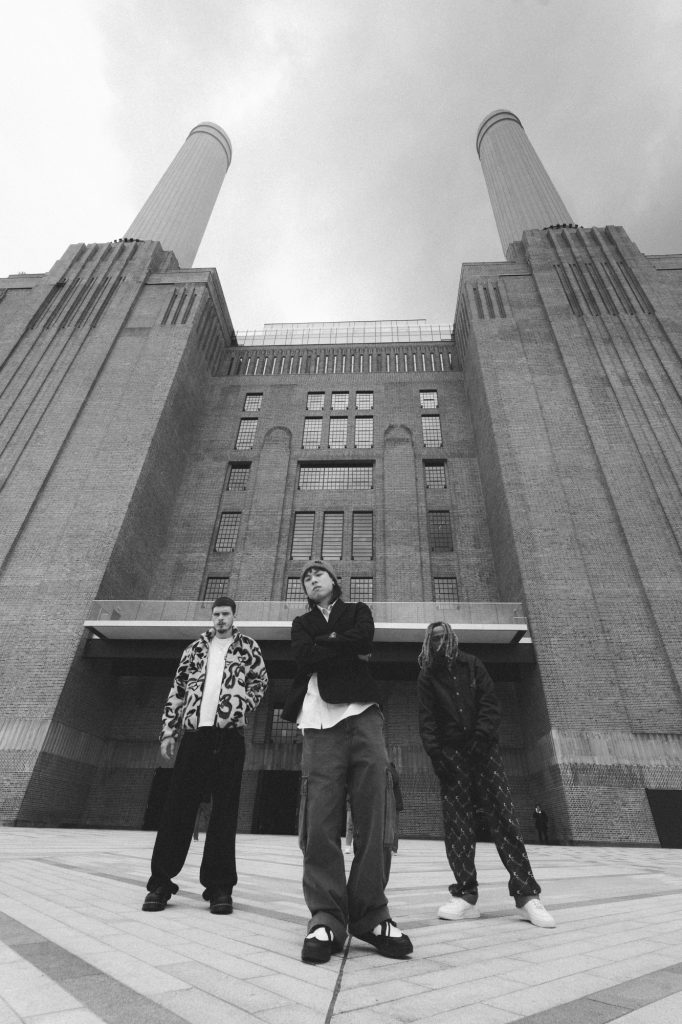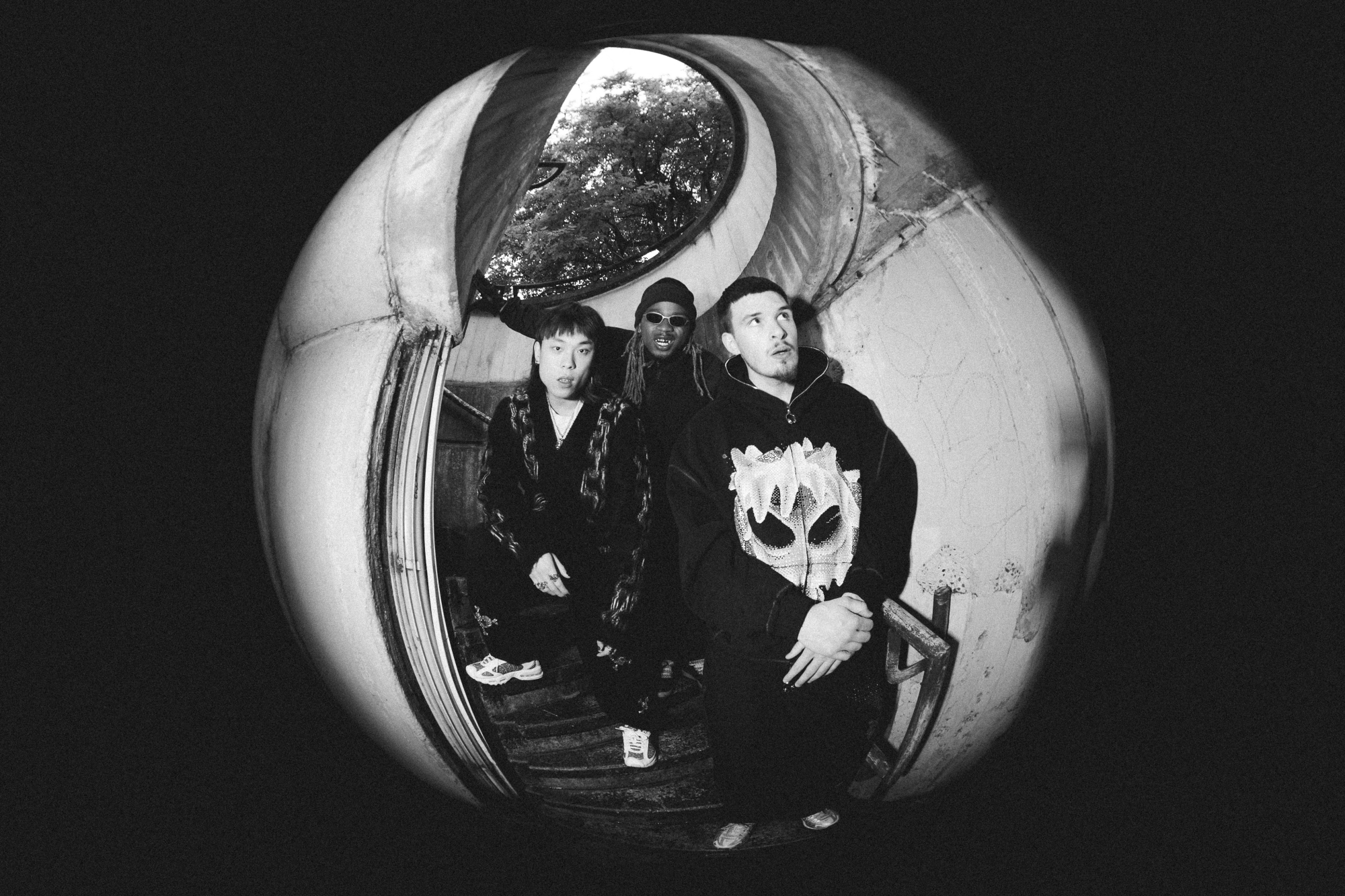The versatile London trio Frozemode have been creating quite a stir since they began dropping tracks, two years ago. A collaboration between mates I.V. GATLIN, Lisong, and Cho-Hollow, their upfront lyrics combined with their provincial and rustic lexicon have resonated with people and their multifaceted production and music stylings, which combines electronic beats and analogue instruments to a nerve-pinching vigour, has seen them open for the likes of garage punkers FIDLAR and hip-hop duo Joey Valence & Brae and getting slots at some of the UK’s biggest festivals.
At the end of August, the group released their latest EP, DEMODE 2. We sent them some questions about the EP, their career, their process, their lyrics, and much more, and these were their answers.
———————————
The music of Frozemode incorporates influences from the members’ versatile tastes, like hip-hop, trap, alt-rock, punk, grime, trap, drill, and classic rock. Do you think now, being in the era of streaming, that it’s beneficial for you guys, as everyone seems to be listening to a bit of everything and no one is really genre-inclined anymore? Could Frozemode have existed and been popular at any other time in history?
I think that the current era of streaming has helped in some ways and maybe not in others. Streaming can help to blend genres but, also, with playlisting, etc., people nowadays like to be able to know what they are getting when they listen to an artist. Loads of the biggest genre-benders, risk-takers, and pioneers existed before the streaming age. But there are also loads, today. So, yeah, I reckon we could’ve existed at another time, but we wouldn’t have been the same people, so the music would probably be different.
Your music mixes digital and analogue instruments, which I think adds to its high-octane energy. Was this something that you planned from the beginning or how did the line-up become what it did, in terms of the instruments?
We started off, each individually finding type beats on YouTube and bringing them to the studio with some pre-written bars. We would jump on all types of beats. From punk to trap, to grime, to DNB, and more. Nowadays, our process has completely changed, but we never lost the need to keep mixing genres and experimenting.
In general, when you began Frozemode, did you envision anything or did you just let what would happen happen? How much of your output is preplanned and how much is free-flowing?
It’s all free-flowing, but, obviously, we wanna be successful. So, we let it all come naturally and then we organise.

Photograph by Nicholas O’Donnell
Courtesy of DSTNCT.SPACE
When it comes to your lyrics, I find they are very distinctive of your generation. For example, a line like “Now the algorithm got me in a feedback loop” probably wouldn’t have made sense twenty years ago. Is this incorporation of modernity conscious or is it just what comes out when you write? Regardless, I think it is an element that helps distinguish what you are doing from previous generations, as much as your sonic range does.
We keep it real and write about what we are feeling or whatever is happening to us on the day. So, some of that will be universal or timeless and some of that will be current. We don’t really think about it, though.
Your music also deals with a lot of the ills of modern living. For example, “BLACK HOLE” deals with (at least from my reading) the impact of quick thrills on long-term mental health, which I know a lot of people today can relate to. Do you consider the broader listenership’s experience with the songs you’re making, or is it just expressing what you feel and letting it land however it does? To use a cliché, do you care about being a “voice of a generation,” or what is your scope?
Nobody is as unique as we like to think. There are so many people in the world and therefore there will always be loads of people who think like you do. If you just express yourself truthfully, there will always be people who can relate.
Beyond music, what other avenues do you look at for lyrical inspiration? Do you think it’s important to read literature or poetry, listen to spoken word or stand-up, or anything like that? Do you think it’s important to exercise your vocabulary and prose or does that get in the way of inherent expression?
We all take inspiration from the world around us, and all forms of media and art. It’s definitely useful to always be open and try to take inspiration from everything. We try to vary the words we use and also create our own way of speaking/writing.
When crafting a song, generally, do the lyrics influence the music or does the music influence the lyrics? What’s your starting point for nailing the overall atmosphere of a track?
Generally, we listen to the music/instrumentation, and that gives us a good starting point and, also, naturally, brings the three of us, topically, closer together.
I think your two EPs thus far are great examples of using the tracklist as a rollercoaster ride of ups and downs for the listener. When releasing larger bodies of work, like EPs or albums, how do you land on which songs to put together and in what order? Do you tease tracklists with your live shows?
Yes, performing songs live can be a great indication of how they will be received, although tracks don’t always have to go down well live to be worth releasing. It’s always a fun challenge for us, putting together a body of work as we want it, to show off our versatility whilst also feeling like it’s a consistent project.
You guys have played at some amazing festivals in your career, like Reading + Leeds, Download, 2000trees, The Great Escape, Radio 1’s Big Weekend, and Rock Away Beach. How do you feel the reception to your stuff differs from festival to festival? Are there any festivals you guys would love to play that you haven’t already?
Age range is a big factor. We’ve done festivals with audiences ranging from five-year-olds to sixty-five-year-olds haha. Obviously, you can’t have a mosh pit if there are kids in the crowd so that changes things. We’d like to play festivals like Glastonbury and Wireless, and then more European festivals, like Rock am Ring.
Now that you’re gaining attention and a reputation, your art is starting to react to some of that. Your track “ASBO BOYS” is a direct response to some criticism and trolling you’ve received online, basically calling out the false claims on their bullshit. Is this something you expected to use your music for or does it feel strange? Is it weird to be perceived?
The first time we ever received some hate comments it hurt lol. It was a big shock. But now we’ve learnt the best way to deal with that stuff is to embrace it and find the humour in it. A lot of those trolls are actually pretty funny.
Now that DEMODE 2 has been out for a while, how have you found the reception?
Our favourite part of this is creating the new songs. So we’re very happy now that it’s out and in the world, and we are grateful to everyone who has listened and responded. Now we are excited to work on the next one.
What plans do you guys have for the future, either near or distant?
We wanna put our heads down for a bit and finish up our next project. Also, we’ll be doing some sick support shows across the UK and Europe.
Frozemode’s latest EP, DEMODE 2, is now available on all streaming platforms. You can keep up with the band’s music, social media accounts, and live dates here.

Aaron Kavanagh is the Founder and Editor-in-Chief of Post-Burnout. His writing can also be found in the Irish Daily Star, Buzz.ie, Totally Dublin, The GOO, Headstuff, New Noise Magazine, XS Noize, DSCVRD and more.

 POST-BURNOUT
POST-BURNOUT